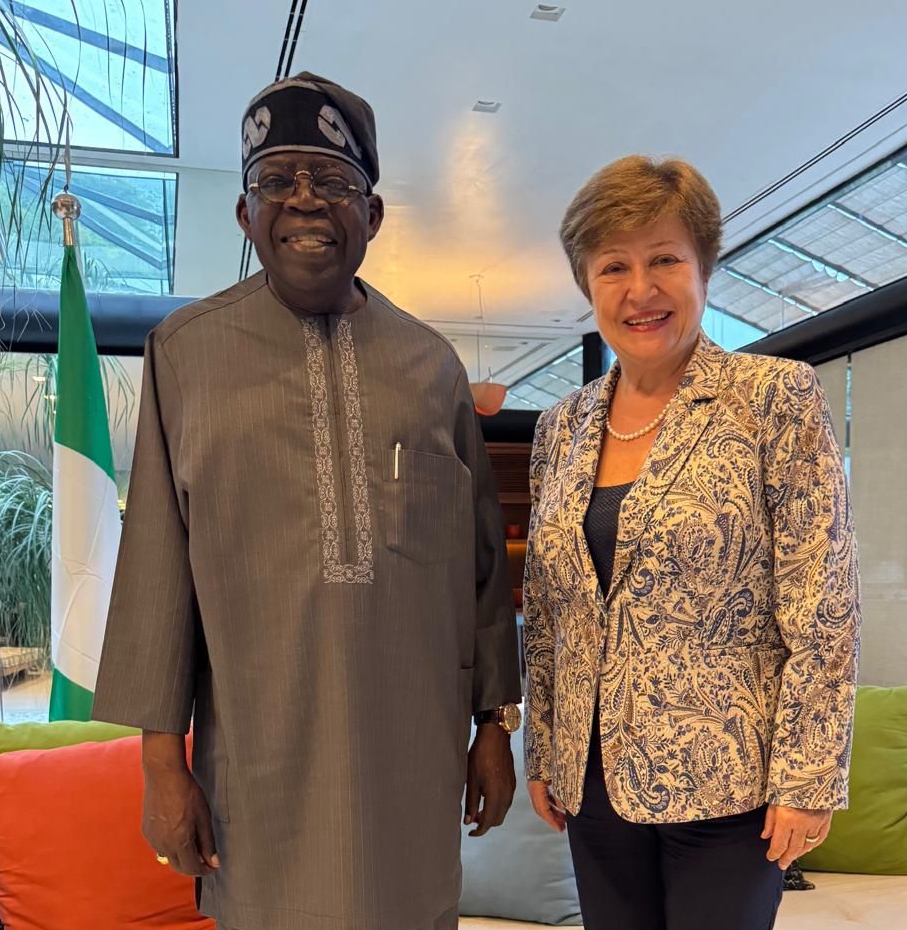IMF’s Role in Nigeria’s Economic Reforms: Hope or Hardship?
The International Monetary Fund (IMF) has lauded Nigeria’s recent economic reforms, describing them as bold steps toward growth and job creation. At the #G20 Summit, Kristalina Georgieva, the IMF Managing Director, expressed support for Nigeria’s efforts, particularly under President Bola Ahmed Tinubu’s leadership:
“Excellent meeting with 🇳🇬 President @officialABAT at the #G20 Summit. Commended Nigeria’s decisive actions to reform the economy, accelerate growth and generate jobs for its vibrant population. The IMF strongly supports Nigeria on this journey.”
However, while the IMF’s endorsement signals confidence in Nigeria’s economic trajectory, public sentiment within the country tells a vastly different story. Citizens and analysts alike are grappling with the realities of subsidy removal and other reforms, which have led to significant economic hardships.
IMF’s Conditionalities and Nigeria’s Economic Experience
Nigeria’s relationship with the IMF is long and storied, marked by cycles of borrowing, economic adjustments, and controversy. IMF loans often come with conditionalities—policy measures and structural reforms aimed at economic stability and debt repayment.
Historically, these conditionalities have included:
- Subsidy removals (e.g., fuel and food subsidies).
- Currency devaluation to reflect market realities.
- Austerity measures such as public spending cuts.
- Economic liberalization (e.g., privatization of state-owned enterprises).
While the IMF asserts that these reforms are necessary for sustainable growth, critics argue that they disproportionately affect low-income populations, exacerbating poverty and inequality.
The Harsh Reality of Subsidy Removal
Among the most contentious reforms under President Tinubu’s administration is the removal of petroleum subsidies. Although the policy aims to curb excessive government spending and promote market efficiency, its implementation has caused a ripple effect of hardships:
- Skyrocketing Fuel Prices:
With subsidies removed, the cost of petrol surged by over 200%, leaving many Nigerians unable to afford transportation or fuel for generators. - Inflation and Rising Costs:
The inflation rate climbed to a historic high, with basic goods and services becoming unaffordable for the average citizen. - Job Losses and Economic Instability:
Businesses reliant on affordable fuel have downsized or shut down, adding to Nigeria’s already high unemployment rate.
Public Reactions: Mixed Views on IMF’s Role
The IMF’s support for Nigeria’s reforms has sparked intense debate, with opinions ranging from cautious optimism to outright skepticism.
Supportive Reactions
Proponents of the IMF-backed reforms argue that these measures are necessary for Nigeria to:
- Address fiscal imbalances.
- Reduce dependency on oil revenue.
- Attract foreign investment by creating a competitive market environment.
Kristalina Georgieva’s statement underscores this perspective, highlighting the potential for long-term growth and job creation.
Critical Voices
Critics, however, have voiced their frustrations with the immediate consequences of these reforms:
“The reforms are harsh and unbearable. Lives and livelihoods are squeezed from the reforms’ pills. What are reforms? Ain’t they to make lives better? 18 months into this, there seems not to be an iota of light sieving through. My question to the IMF/WB on this matter.” – Nancy Illoh
Dr. Yungong Theophilus Jong, a policy expert, raised concerns about the fairness of IMF’s financial charges:
“Borrowing from the IMF always comes with strings attached—policies, reforms, and now surcharges. I’m wondering, though, are these charges a fair tool or just making things worse for already vulnerable nations?”
Hope Amid Hardship: The Government’s Perspective
The Nigerian government has defended its reform agenda, emphasizing the long-term benefits of these policies. President Tinubu’s administration has outlined several measures aimed at cushioning the effects of subsidy removal and other reforms:
- Social Investment Programs: Initiatives to provide financial support and skills training to vulnerable populations.
- Palliatives: Distribution of cash transfers and food supplies to alleviate immediate economic pressures.
- Infrastructure Investment: Plans to reinvest savings from subsidy removal into critical infrastructure projects like roads, schools, and hospitals.
Despite these efforts, many Nigerians remain unconvinced, citing delays in implementation and the scale of economic hardship.
IMF’s Global Approach: Fair or Flawed?
The criticisms of IMF policies in Nigeria are not unique. Across the globe, nations that have borrowed from the IMF have reported similar challenges:
- Increased Inequality: Wealth gaps often widen as austerity measures disproportionately impact the poor.
- Economic Dependence: Critics argue that IMF loans create cycles of dependency, as nations struggle to meet repayment terms.
- Loss of Sovereignty: Governments may feel pressured to prioritize IMF-prescribed policies over domestic needs.
While the IMF maintains that its programs are designed to foster stability and growth, the outcomes have been mixed, leading many to question the efficacy of its approach.
The Path Forward: Balancing Reform with Relief
For Nigeria to navigate its economic challenges effectively, a balanced approach is essential. This means implementing reforms that drive growth while ensuring adequate support for those most affected by these policies.
Recommendations for the Nigerian Government
- Transparent Communication: Clearly outline the benefits and timelines of reforms to rebuild public trust.
- Targeted Interventions: Focus on providing subsidies or support for critical sectors like agriculture and transportation.
- Strengthen Institutions: Enhance the capacity of regulatory bodies to manage economic transitions effectively.
- Engage Stakeholders: Foster dialogue with labor unions, civil society groups, and the private sector to ensure inclusive decision-making.
Conclusion: A Critical Crossroad for Nigeria
The IMF’s endorsement of Nigeria’s economic reforms highlights the potential for growth and stability. However, the immediate consequences of these policies have sparked widespread hardship and debate.
As the government continues to implement its reform agenda, it must prioritize measures that alleviate the economic burden on ordinary Nigerians. Only then can the promise of growth and job creation become a reality.
By balancing reform with relief, Nigeria can chart a course toward sustainable development, ensuring that no citizen is left behind in the journey to economic recovery.
